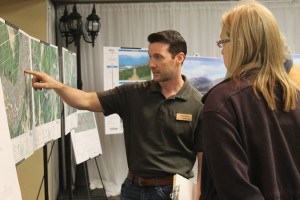
ATCO Electric revealed more details about a new power line and a proposed transmission facility that will connect Jasper National Park to the province’s main electricity grid during a public information session, May 26.
Known as the Jasper Interconnection Project, the project will still need to be approved by Parks Canada and the Alberta Utilities Commission before it can proceed.
Chris Clark, ATCO’s vice-president of transmission planning and operation, said she believes the project will meet all the necessary requirements to begin construction by August 2017.
“General public, landowners, stake owners—anyone is welcome to share their thoughts on the project,” said project planner Landon Bawol. “If anyone brings up any concerns at this session then they will be noted and taken into consideration.”
The project includes building a new, 45-kilometre, transmission line that will connect Jasper to another proposed transmission line near Hinton. The project also includes a new substation that would be located where the existing Palisades Power Plant is, eight kilometers north of town.
Should the project go ahead then the Palisades Power Plant—which is also owned and operated by ATCO Electric—will be decommissioned and torn down.
The current electricity plant that provides Jasper with power is an isolated system—meaning it’s not connected to Alberta’s main grid—and is currently Jasper’s primary source of electricity. The Astoria Generating Station also contributes power to the park’s electrical network, but to a far lesser degree.
Clark said the Palisades Power Plant is standing on its last leg, and by 2017 most of the plant will need to be replaced. However, after conducting a feasibility study, ATCO decided it would be better to scratch the whole plant—which is how the Interconnection Project came to be.
“We have determined that when you look at the costs and the implications as far as the reliability of the power plant, it just makes more sense to connect Jasper to the rest of the Alberta Interconnected Electric System,” Clark said. “We believe it’s the most economic and reliable way to serve the community into the future.”
If approved, the transmission line will run from the park’s east gate to the existing Palisades plant, paralleling Highway 16 and a large portion of the Kinder Morgan’s Trans Mountain Pipeline route.
The anticipated line will be built using 13 to 16 metre high wooden poles that will be about 110 metres apart from one another. However, Clark said the final design won’t be confirmed until later this year.
“We still have to go through our design detail phase,” Clark said. “The transmission line is a size that will meet the requirements of the Jasper community and will allow for a little bit of growth, but by no means is it sized for major transportation of lots of power,” she said, essentially shutting down the idea that the new transmission line could one day become a major power corridor connected to British Columbia’s power grid.
Dave Hatto, vice-chair of the Jasper Environmental Association, attended the information session, and said he believes the transmission line is something that is needed, but said he still had some reservations about the proposed route.
“There’s one section of the routing where it deviates from the Kinder Morgan right-of-way and drops down Snaring Road and just goes along the side of the road,” Hatto said. “I feel that the routing should be along an already disturbed right-of-way or as close as possible rather than creating a new right-of-way.”
Bawol said ATCO is working with Parks on any environmental concerns it might pose.
“We’ve worked hard to find the lowest environmental impact,” Bawol said.
From now until September, ATCO will be busy holding public consultations about the project and, if approved, construction is slated to begin August 2017 and is expected to be completed in May 2018.
Kayla Byrne
[email protected]
